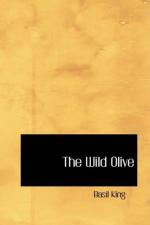V
As the days passed, one much like another, and the retreat seemed more and more secure, it was natural that Ford’s thoughts should dwell less on his own danger and more on the girl who filled his immediate horizon. The care with which she foresaw his wants, the ingenuity with which she met them, the dignity and simplicity with which she carried herself through incidents that to a less delicate tact must have been difficult, would have excited his admiration in any case, even if the namelessness which helped to make her an impersonal element in the episode had not stirred his imagination. He was obliged to remind himself often that she was “not his type of girl,” in order to confine his heart within the limits which the situation imposed.
It worried him, therefore, it even hurt him, that in spite of all the openings he had given her, she had never offered him a sign of her belief in his innocence. For this reason he took the first occasion when she was seated at her easel, with the dog lying at her feet, to lay his case before her.
He told her of his overindulged boyhood, as the only child of a wealthy New York merchant. He outlined his profitless years at the university, where a too free use of money had hindered work. He narrated the disasters that had left him at the age of two-and-twenty to begin life for himself—his father’s bankruptcy, followed by the death of both his parents within the year. He had been eager to start in at the foot of the ladder and work his way upward, when the proposal was made which proved fatal.
Old Chris Ford, his great-uncle, known throughout the Adirondack region as “the lumber king,” had offered to take him, train him to the lumber business, and make him his heir. An eccentric, childless widower, commonly believed to have broken his wife’s heart by sheer bitterness of tongue, old Chris Ford was hated, feared, and flattered by the relatives and time-servers who hoped ultimately to profit by his favor. Norrie Ford neither flattered nor feared his powerful kinsman, but he hated him with the best. His own instincts were city born and bred. He was conscious, too, of that aptitude with which the typical New-Yorker is supposed to come into being—the capacity to make money. He would have preferred to make it on his own ground and in his own way; and had it not been for the counsels of those who wished him well, he would have replied to his great-uncle’s offer with a courteous “No.” Wiser heads than his pointed out the folly of such a course as that; and so, reluctantly, he entered on his apprenticeship.
In the two years that followed he could not see what purpose he served other than that of a mark for the old man’s poisoned wit. He was taught nothing, and paid nothing, and given nothing to do. He slept under his great-uncle’s roof and ate at his table, but the sharp tongue made the bed hard to lie on and the bread difficult to swallow down. Idleness reawakened the propensity to vicious habits which he thought he had outlived, while the rough society of the lumber camps, in which he sought to relieve the tedium of time, extended him the welcome which Falstaff and his comrades gave Prince Hal.




